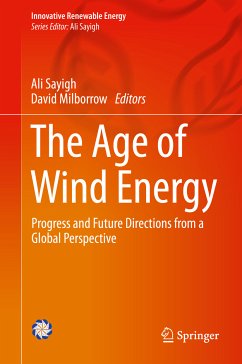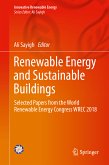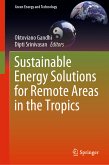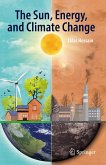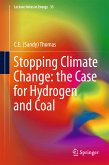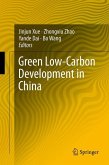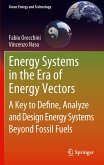The Age of Wind Energy (eBook, PDF)
Progress and Future Directions from a Global Perspective
Redaktion: Sayigh, Ali; Milborrow, David


Alle Infos zum eBook verschenken

The Age of Wind Energy (eBook, PDF)
Progress and Future Directions from a Global Perspective
Redaktion: Sayigh, Ali; Milborrow, David
- Format: PDF
- Merkliste
- Auf die Merkliste
- Bewerten Bewerten
- Teilen
- Produkt teilen
- Produkterinnerung
- Produkterinnerung

Hier können Sie sich einloggen

Bitte loggen Sie sich zunächst in Ihr Kundenkonto ein oder registrieren Sie sich bei bücher.de, um das eBook-Abo tolino select nutzen zu können.
This unique volume on wind energy features contributions from the world's leading research and development pioneers in the field of renewable energy. It discusses advances in offshore wind technology, grid-connected systems, grid stabilization and wind turbine design and highlights. Written from an international perspective, chapters focus on the status of wind energy in various regions and countries across the globe, outlining the positive impact its implementation has had on delaying the catastrophic effects of climate change.
- Geräte: PC
- ohne Kopierschutz
- eBook Hilfe
- Größe: 14.83MB
![Renewable Energy and Sustainable Buildings (eBook, PDF) Renewable Energy and Sustainable Buildings (eBook, PDF)]() Renewable Energy and Sustainable Buildings (eBook, PDF)81,95 €
Renewable Energy and Sustainable Buildings (eBook, PDF)81,95 €![Sustainable Energy Solutions for Remote Areas in the Tropics (eBook, PDF) Sustainable Energy Solutions for Remote Areas in the Tropics (eBook, PDF)]() Sustainable Energy Solutions for Remote Areas in the Tropics (eBook, PDF)73,95 €
Sustainable Energy Solutions for Remote Areas in the Tropics (eBook, PDF)73,95 €![The Sun, Energy, and Climate Change (eBook, PDF) The Sun, Energy, and Climate Change (eBook, PDF)]() Eklas HossainThe Sun, Energy, and Climate Change (eBook, PDF)24,95 €
Eklas HossainThe Sun, Energy, and Climate Change (eBook, PDF)24,95 €![Stopping Climate Change: the Case for Hydrogen and Coal (eBook, PDF) Stopping Climate Change: the Case for Hydrogen and Coal (eBook, PDF)]() C. E. Sandy ThomasStopping Climate Change: the Case for Hydrogen and Coal (eBook, PDF)73,95 €
C. E. Sandy ThomasStopping Climate Change: the Case for Hydrogen and Coal (eBook, PDF)73,95 €![Using Energy Crops for Biofuels or Food: The Choice (eBook, PDF) Using Energy Crops for Biofuels or Food: The Choice (eBook, PDF)]() Annoula PaschalidouUsing Energy Crops for Biofuels or Food: The Choice (eBook, PDF)73,95 €
Annoula PaschalidouUsing Energy Crops for Biofuels or Food: The Choice (eBook, PDF)73,95 €![Green Low-Carbon Development in China (eBook, PDF) Green Low-Carbon Development in China (eBook, PDF)]() Green Low-Carbon Development in China (eBook, PDF)73,95 €
Green Low-Carbon Development in China (eBook, PDF)73,95 €![Energy Systems in the Era of Energy Vectors (eBook, PDF) Energy Systems in the Era of Energy Vectors (eBook, PDF)]() Fabio OrecchiniEnergy Systems in the Era of Energy Vectors (eBook, PDF)113,95 €
Fabio OrecchiniEnergy Systems in the Era of Energy Vectors (eBook, PDF)113,95 €-
-
-
Dieser Download kann aus rechtlichen Gründen nur mit Rechnungsadresse in A, B, BG, CY, CZ, D, DK, EW, E, FIN, F, GR, HR, H, IRL, I, LT, L, LR, M, NL, PL, P, R, S, SLO, SK ausgeliefert werden.
- Produktdetails
- Verlag: Springer International Publishing
- Seitenzahl: 338
- Erscheinungstermin: 10. Oktober 2019
- Englisch
- ISBN-13: 9783030264468
- Artikelnr.: 57907198
- Verlag: Springer International Publishing
- Seitenzahl: 338
- Erscheinungstermin: 10. Oktober 2019
- Englisch
- ISBN-13: 9783030264468
- Artikelnr.: 57907198
- Herstellerkennzeichnung Die Herstellerinformationen sind derzeit nicht verfügbar.
